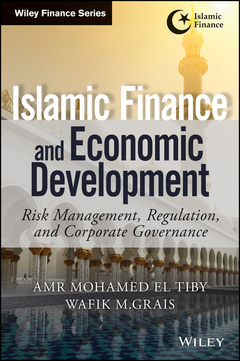Description
Islamic Finance and Economic Development
Risk, Regulation, and Corporate Governance
Wiley Finance Series
Authors: El Tiby Ahmed Amr Mohamed, Grais Wafik
Language: English
Keywords
Islamic Finance and Economic Development; Amr Mohamed El Tiby; Wafik Grais; Islamic finance; Islamic market; Middle East financial operations; Shari'a finance; financial risk management; corporate governance; international finance; global finance; international banking; IIFS; international regulatory standards; economic policy; financial crisis; effective financial framework; global financial growth; contagion and risk; Islamic operations; Islamic banking; Middle East banking; Asian banking; Asian economics; Asian market
79.77 €
In Print (Delivery period: 14 days).
Add to cart256 p. · 15.8x23.6 cm · Hardback
Description
/li>Contents
/li>Biography
/li>
A comprehensive guide to mitigating risk and fostering growth in the Islamic financial sector
Islamic finance, like conventional finance is a business of financial intermediation. Its distinctive features relate to the requirement that it abides by Shari'a rules that promote fairness of contracts and prevention of exploitation, sharing of risks and rewards, prohibition of interests, and tangible economic purpose. Islamic finance should not fund activities considered ?haram? or sinful. In Islamic Finance and Economic Development: Risk, Regulation, and Corporate Governance, authors Amr Mohamed El Tiby and Wafik M. Grais expound how these distinctive features bear on the opportunities and challenges facing the Islamic finance industry?s development, risk management, regulation and corporate governance.
An experienced banker with various Middle East banking institutions, notably as former Vice President at UAE Union National Bank and Mashreq bank, Dr. El Tiby offers an informed perspective on corporate finance from within the Islamic finance industry. With a long experience in international development and finance, notably as former Director at the World Bank and Founder and Chairman of a Cairo-based Financial Advisors company, Dr. Grais brings global financial experience on the topics of financial systems assessments, corporate governance, Islamic finance, and public policy.
- Covers the history and basics of Islamic finance, and provides insight into current conditions and future landscape
- Explores regulatory framework, including opportunities and challenges for the industry?s development and mainstreaming
- Presents an approach to developing a systemic Shari'a governance framework to govern operations in the Islamic finance industry
Preface ix
Acknowledgments xv
Acronyms xvii
About the Authors xxi
PART ONE Emergence of Modern Islamic Finance 1
CHAPTER 1 History and Core Principles of Islamic Finance 3
CHAPTER 2 Islamic Finance: Opportunity for Egypt’s Development 19
PART TWO Managing Systemic Risks 51
CHAPTER 3 Risks, Spillovers, and Distress 55
CHAPTER 4 Coping with Crises: Policies, Institutions, and Markets 67
PART THREE Regulatory Challenges 93
CHAPTER 5 The Dilemma of Tailor-Made versus Mainstream Regulation 95
CHAPTER 6 Toward an Enabling Framework 107
PART FOUR Corporate Governance 121
CHAPTER 7 Financial Fiduciary Governance 123
CHAPTER 8 Corporate Governance and Shari’a Compliance 145
CHAPTER 9 Toward a Systemic Shari’a Governance Framework 181
APPENDIX Islamic Finance: The International Landscape 205
References 217
Index 231
AMR EL TIBY earned his B.A in Commerce from Cairo University in 1980, majoring in Business. He earned his Diploma in Finance from Cairo University in 1985 and his MA in Economics from The American University in Cairo in 2003. In 2009, he earned his PhD from The American University in London. Dr. El Tiby has over 30 years of banking experience in the Middle East and the Gulf Region in both conventional as well as Islamic finance. His area of research focuses on banking risk and regulations. He is also the author of Islamic Banking, published by Wiley in 2011.
WAFIK M. GRAIS is senior international adviser on finance, investments and public policy. He was founder and chairman of Viveris Mashrek Financial Advisors. He held senior positions at the World Bank in Washington, DC, where he notably managed country programs on countries of the Middle East and North Africa as well as Europe and Central Asia. He has been published on the subjects of finance, corporate governance, Islamic finance, macroeconomic policy, and energy policies. He holds a PhD in Economics and degrees in Mathematical Economics and Political Science from the University of Geneva.




